What to Do When a Background Check Shows a False Criminal Record

Understanding False Criminal Records in Background Checks
When applying for a job, renting an apartment, or undergoing other vetting processes, background checks are a common and critical step. However, finding a false criminal record in your background check can be alarming and have far-reaching consequences. This section explores what it means when a background check shows a false criminal record, how it occurs, and why addressing the issue promptly is essential.
Introduction to Background Checks
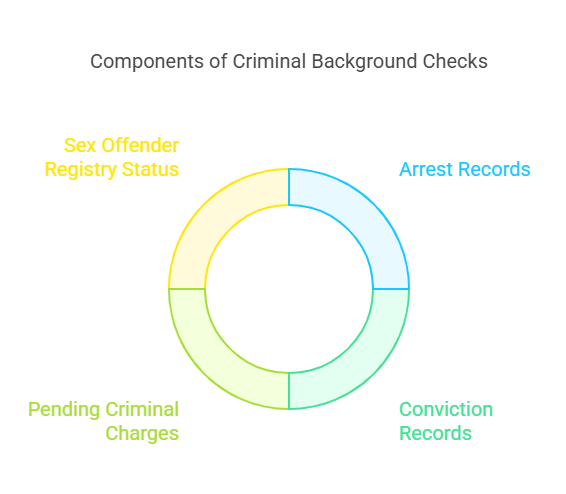
Background checks are reports used to verify an individual’s history in areas such as employment, education, credit, and criminal records. Employers, landlords, and even financial institutions often rely on these checks to assess a person’s suitability for a job, tenancy, or loan.
For criminal background checks, these reports typically include:
- Arrest Records
- Conviction Records
- Pending Criminal Charges
- Sex Offender Registry Status
When accurate, criminal background checks help promote safety, security, and informed decision-making. However, errors in these reports can cause significant harm to individuals.
What is a False Criminal Record in a Background Check?
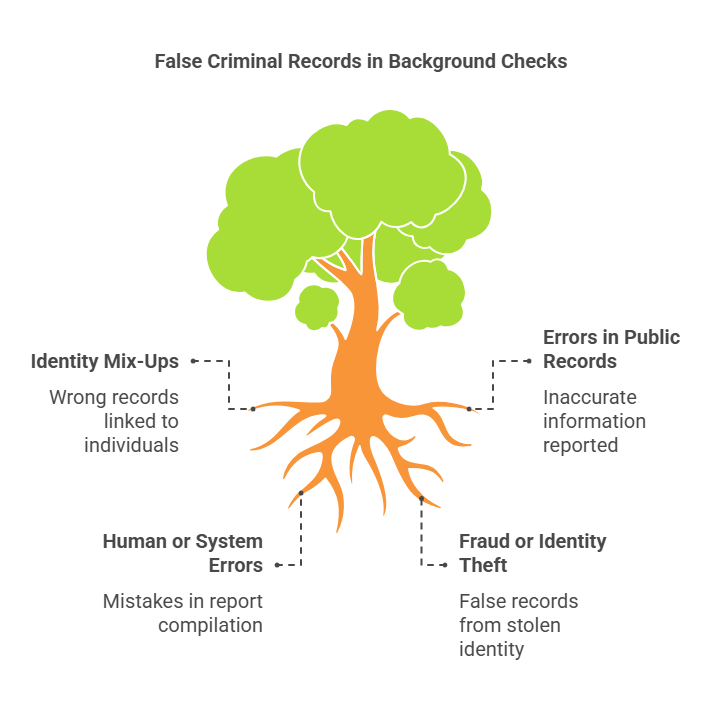
A false criminal record occurs when inaccurate or misleading information about an individual’s criminal history appears on a background check. These errors can suggest a person has a criminal record when they do not or misrepresent the nature of their actual record.
Common Causes of False Criminal Records:
- Identity Mix-Ups: A criminal record associated with someone else is wrongly linked to your name, often due to similar names or Social Security numbers.
- Errors in Public Records: Mistakes in court or police databases, such as outdated or incomplete information, can be reported inaccurately.
- Human or System Errors: Background check companies may make errors when compiling reports, such as mismatching records or failing to update databases.
- Fraud or Identity Theft: If your identity has been stolen, fraudulent activities committed in your name could result in false records appearing in your background check.
How Do False Criminal Records Impact Individuals?
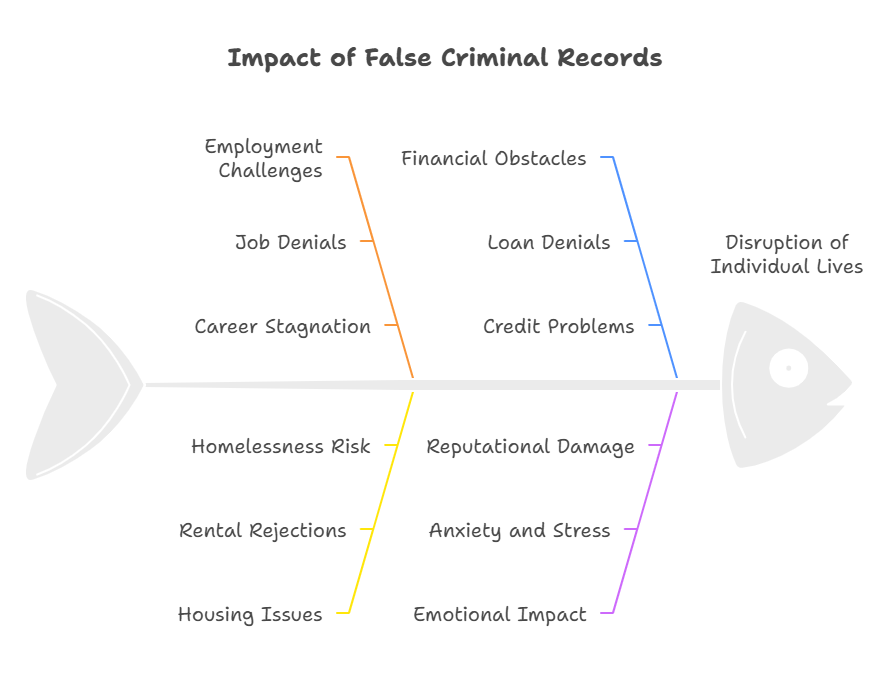
False criminal records can have severe consequences, often disrupting a person’s life in unexpected ways.
Consequences of False Criminal Records:
- Job Denials: Employers may reject job applicants based on inaccurate criminal history, even if the error is eventually corrected.
- Housing Issues: Landlords may refuse to rent to individuals with a false criminal record, leaving them without stable housing options.
- Loan and Credit Challenges: Financial institutions may deny loans or credit to individuals they perceive as high-risk due to a criminal record.
- Reputational Damage: A false record can tarnish an individual’s reputation among colleagues, friends, and family.
- Emotional and Mental Strain: The stress of addressing errors, combined with lost opportunities, can lead to anxiety, depression, or frustration.
How Often Do False Criminal Records Occur?
Errors in background checks are more common than most people realize. According to studies:
- 1 in 5 background checks contains an error, ranging from minor inaccuracies to major mistakes like false criminal records.
- Identity mix-ups account for a significant portion of these errors, especially in large databases with limited verification protocols.
- Outdated information is another leading cause, as some records are not regularly updated in public and private databases.
These statistics underscore the importance of individuals being proactive about verifying the accuracy of their background checks.
Why Do Errors Happen in Background Checks?
Errors in background checks can occur for various reasons, including systemic, procedural, or technological shortcomings.
Systemic Issues:
- Poor Data Sharing Between Agencies: When government databases do not synchronize updates, outdated records can persist.
- Limited Oversight of Background Check Companies: In some cases, companies may cut corners in data verification to save time or reduce costs.
Procedural Shortcomings:
- Improper Name Matching: Common names or incomplete identifiers (e.g., missing middle names) can lead to record mismatches.
- Inadequate Dispute Mechanisms: Not all background check services provide straightforward ways to correct errors.
Technological Gaps:
- Database Errors: Software glitches or incorrect database integrations can lead to inaccurate data being reported.
- Lack of AI Validation: Without sophisticated algorithms to cross-check records, errors can go unnoticed during automated screenings.
Real-Life Examples of False Criminal Records
False criminal records are not just theoretical; they happen to real people every day. Consider these scenarios:
- John, a Job Seeker: John was denied employment because his background check incorrectly listed a felony charge due to a database error. He had to spend weeks disputing the record, delaying his job search.
- Maria, a Tenant: Maria was refused housing because a criminal conviction from someone with a similar name appeared on her background check. It took legal action to correct the mistake.
These cases illustrate the importance of vigilance and timely action when dealing with false records.
How to Address a False Criminal Record in a Background Check
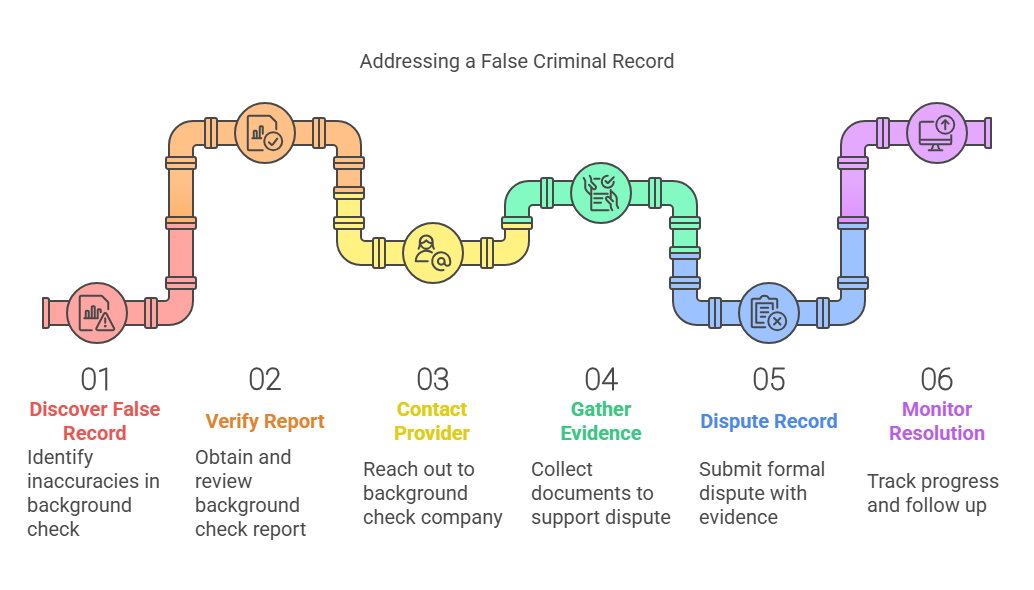
Discovering a false criminal record in your background check can be alarming, but it’s not an insurmountable issue. By taking immediate action and following a structured approach, you can resolve inaccuracies and protect your reputation. This section outlines the key steps to address false criminal records, provides insights into the dispute process, and highlights tools and best practices to prevent future errors.
What to Do if You Discover a False Criminal Record
If a false criminal record appears in your background check, it’s essential to act quickly and systematically. Follow these steps:
1. Verify the Report
- Request a Copy: Obtain a complete copy of the background check report from the company or entity that conducted it.
- Identify Errors: Review the report carefully to pinpoint the inaccuracies, such as incorrect names, charges, or dates.
- Cross-Check Your Records: Compare the report with your personal records to confirm the discrepancies.
2. Contact the Background Check Provider
- Reach Out Immediately: Contact the company responsible for the background check. Their contact information should be on the report.
- Explain the Error: Provide clear details about the false information and request a review.
3. Gather Supporting Evidence
- Collect official documents to prove the error, such as:
- Court records showing a case dismissal or acquittal
- Identification to verify your identity (e.g., driver’s license, Social Security card)
- Proof of employment or residence during the alleged offense timeframe
4. Dispute the False Record
- Submit a Formal Dispute: Write a detailed dispute letter to the background check company. Include supporting evidence and a request for correction.
- Notify the Employer or Landlord: If the false record affects a job or housing application, inform the relevant party about the dispute. Provide evidence of your efforts to resolve the issue.
5. Monitor the Resolution Process
- Follow Up: Keep track of the dispute’s progress and request updates from the background check provider.
- Obtain a Corrected Report: Once the issue is resolved, request a new background check to confirm the correction.
How to Dispute a False Criminal Record
The dispute process varies depending on the source of the error. Below are detailed steps for different scenarios:
Disputing Errors with the Background Check Company
- Step 1: Contact the company and file a dispute.
- Step 2: Provide detailed documentation supporting your claim.
- Step 3: Wait for the investigation (typically completed within 30 days under the Fair Credit Reporting Act).
- Step 4: Receive the results of the investigation, including any corrections made to your report.
Disputing Errors with Public Records
If the error originates from public records (e.g., court or police databases):
- Contact the Relevant Agency: Reach out to the court, police department, or other agencies responsible for the record.
- Request a Correction: Submit evidence proving the inaccuracy and ask for an official correction.
- Confirm Updates: Ensure the corrected records are shared with relevant databases and background check providers.
Legal Options for Resolving False Criminal Records
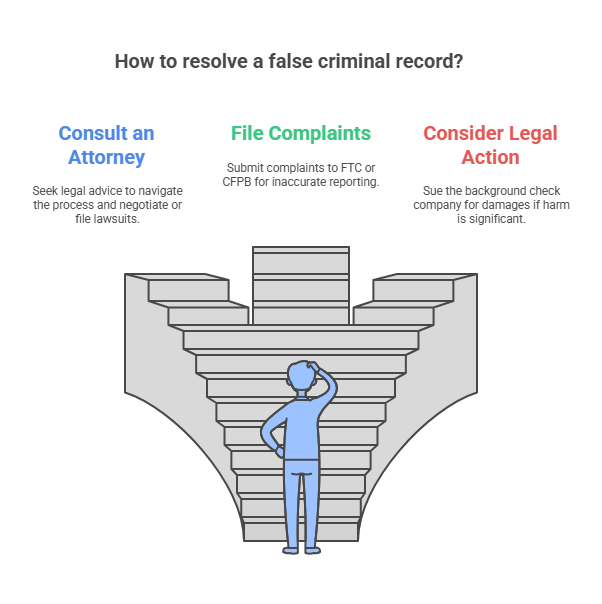
In some cases, resolving a false criminal record may require legal assistance.
1. Consult an Attorney
- Seek advice from a lawyer specializing in criminal law, consumer protection, or background check disputes.
- An attorney can guide you through the process, negotiate with companies, or file lawsuits if necessary.
2. File Complaints with Regulatory Agencies
If the background check provider is unresponsive or unwilling to correct errors:
- Federal Trade Commission (FTC): File a complaint about inaccurate reporting under the Fair Credit Reporting Act.
- Consumer Financial Protection Bureau (CFPB): Submit a grievance regarding violations of consumer rights.
3. Consider Legal Action
If a false criminal record causes significant harm (e.g., loss of a job), you may sue the background check company for damages.
Using Exact Background Checks for Accurate Reports
About Exact Background Checks
Exact Background Checks offers reliable, comprehensive services for individuals and employers to verify criminal history records.
Benefits of Using Exact Background Checks:
- Accurate Reports: Advanced technology minimizes errors and ensures accurate data collection.
- Compliance with Laws: Exact Background Checks adheres to the Fair Credit Reporting Act and other relevant regulations.
- Dispute Support: The service provides guidance for identifying and correcting inaccuracies in your records.
- Comprehensive Screening: Reports include criminal history, eviction records, credit checks, and more.
By choosing reputable services like Exact Background Checks, individuals and businesses can avoid the pitfalls of inaccurate reporting.
Preventing False Criminal Records in the Future
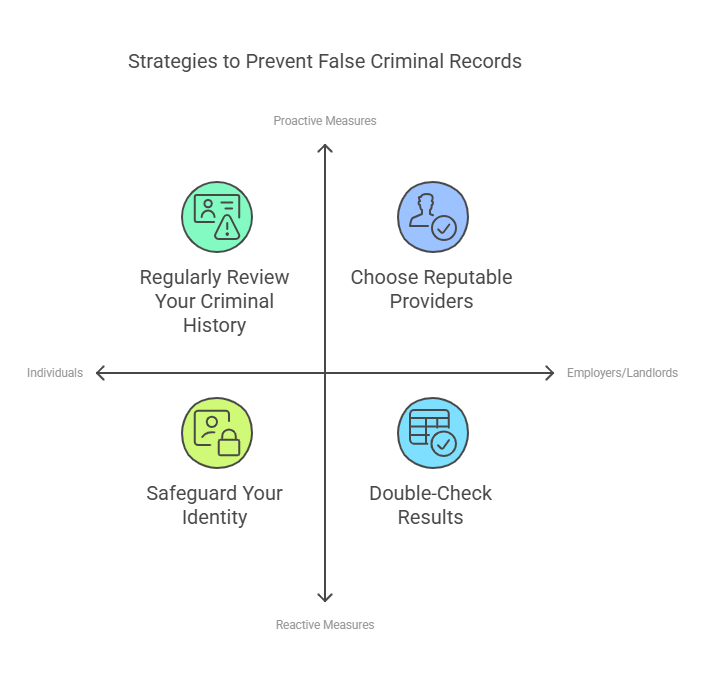
Taking proactive steps can help reduce the risk of false criminal records appearing in future background checks.
Tips for Individuals:
- Regularly Review Your Criminal History: Request personal background checks periodically to identify and address errors early.
- Use Trusted Services: Opt for background check companies known for accuracy and compliance.
- Safeguard Your Identity: Protect your personal information to minimize the risk of identity theft.
Tips for Employers and Landlords:
- Choose Reputable Providers: Work with licensed and compliant background check companies.
- Double-Check Results: Verify critical information before making decisions based on background checks.
- Inform Applicants of Adverse Actions: Notify candidates of issues in their reports and allow them to dispute errors.
Common Mistakes to Avoid
When dealing with a false criminal record, avoid these pitfalls:
- Ignoring the Issue: Failing to address errors promptly can lead to long-term consequences.
- Incomplete Disputes: Ensure you provide all necessary documentation and details when disputing a record.
- Overlooking Legal Help: Don’t hesitate to consult an attorney if disputes are unresolved.
Legal Aspects of False Criminal Records
1. The Fair Credit Reporting Act (FCRA)
The Fair Credit Reporting Act (FCRA) is the cornerstone of consumer protection when it comes to background checks. It ensures that individuals have the right to accurate information in their reports and provides avenues for dispute and correction.
Key FCRA Provisions:
- Accuracy and Privacy: Background check companies must take reasonable steps to ensure reports are accurate and protect sensitive personal data.
- Dispute Rights: Consumers have the right to dispute errors and receive corrections within 30 days.
- Adverse Action Notifications: Employers and landlords must notify individuals if they are denied opportunities based on background check results.
If a false criminal record appears on a report, the background check company or the party using the report (e.g., employer or landlord) may be held liable under the FCRA if they fail to address the error promptly.
2. Liability for Background Check Companies
Companies providing background checks have a legal obligation to ensure the accuracy of their reports. If they fail to correct false information or neglect to investigate disputes:
- FCRA Penalties: Individuals can file complaints with the FTC or CFPB or pursue legal action.
- Civil Lawsuits: Affected individuals can sue for damages caused by false reports, including lost wages, emotional distress, and reputational harm.
3. State and Local Laws
In addition to federal laws, many states have their own regulations governing background checks. For instance:
- Some states impose stricter guidelines on the use of criminal records in employment decisions.
- Local “ban-the-box” laws prevent employers from inquiring about criminal history during the initial hiring process.
Understanding local laws is crucial for individuals and businesses to ensure compliance.
4. Privacy Rights Under the California Consumer Privacy Act (CCPA)
For residents of California, the California Consumer Privacy Act (CCPA) provides additional protections:
- Individuals have the right to access their personal information collected by background check companies.
- Consumers can request corrections or deletion of inaccurate data.
- Companies must disclose how they use and store consumer information.
Violations of the CCPA can result in substantial penalties for non-compliant companies.
5. Defamation and False Reporting
If a background check company knowingly or negligently includes false criminal information, it may be liable for defamation. Individuals can file lawsuits claiming harm to their reputation or livelihood due to inaccurate reporting.
Frequently Asked Questions
What should I do if a criminal record on my background check is incorrect?
First, obtain a copy of the report to verify the error. Then, contact the background check provider or relevant agency to dispute the false record. Provide supporting documentation and follow up regularly to ensure the issue is resolved.
Can a false criminal record prevent me from getting a job?
Yes, a false criminal record can lead to denial of employment. However, employers are required to notify you if they take adverse action based on a background check, giving you an opportunity to dispute inaccuracies.
How long does it take to correct a false criminal record?
Under the FCRA, background check companies must investigate disputes and correct errors within 30 days. However, the timeline may vary if the error originates from public records, which could require additional time to resolve.
Can I sue if a background check shows a false criminal record?
Yes, you can sue under the FCRA if the background check company fails to correct errors or investigate disputes properly. You may also have grounds for a defamation lawsuit if the false record causes significant harm.
How can I prevent false criminal records in future background checks?
Regularly request personal background checks to review your records. Use reputable services like Exact Background Checks to ensure accuracy. Additionally, safeguard your personal information to minimize the risk of identity theft or mix-ups.
Conclusion
When a background check shows a false criminal record, the consequences can be severe, impacting employment, housing, and personal reputation. However, by understanding your legal rights and taking proactive steps, you can resolve inaccuracies and prevent future occurrences.
Key takeaways from this article:
- False criminal records can occur due to database errors, identity mix-ups, or negligence by background check companies.
- The Fair Credit Reporting Act (FCRA) and other laws provide robust protections, enabling individuals to dispute errors and hold negligent companies accountable.
- Tools like Exact Background Checks offer reliable services for verifying records and ensuring compliance with legal requirements.
- If disputes remain unresolved, legal action may be necessary to address the issue and recover damages.
Take Action Today: Whether you’re an individual or an employer, it’s essential to prioritize accuracy in background checks. By staying informed, leveraging trusted services, and adhering to legal standards, you can protect your rights and maintain a fair screening process.



